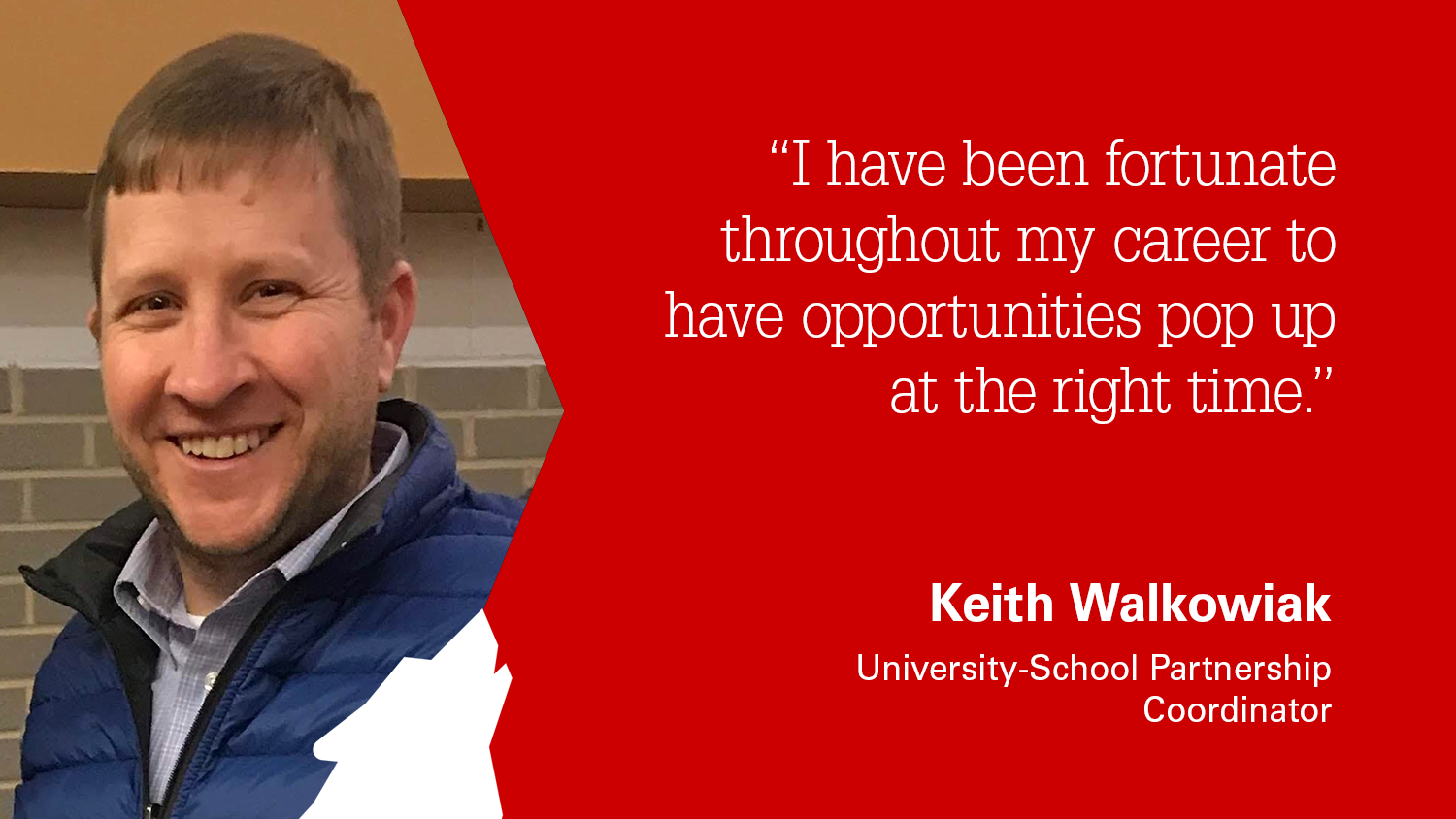University-School Partnership Coordinator Keith Walkowiak: ‘While I Am No Longer in a Classroom…I Appreciate the Ability to Collaborate and Build Relationships with Principals and Mentor Teachers’

When Keith Walkowiak first started college in the 1990s, he had no goals of ever becoming an educator. However, after seizing on opportunities as they presented themselves, he became both a teacher and administrator before joining the NC State College of Education, where he has helped hundreds of pre-service teachers in the elementary education program and middle grades English Language Arts and social studies program receive classroom training through his role as the university-school partnership coordinator.
As a college freshman, Walkowiak originally planned to study physical therapy, but was eventually inspired by an advisor to change programs and study health and physical education instead.
While working as a health and physical education teacher in Louisa, Virginia, he was convinced by some teacher friends to join a master’s program for school administration. Although he hadn’t planned on leaving the classroom to become a school leader, he found himself taking on an interim assistant principal position when a need arose, and he ultimately accepted an assistant principal role full time.
“I have been fortunate throughout my career to have opportunities pop up at the right time and, fortunately, I had the right degrees and qualifications to apply my skill set,” Walkowiak said. “My advice to anyone contemplating an advanced degree would be go ahead and get it. You do not need to make use of it immediately and you never know when an opportunity will be in front of you.”
As an assistant principal at Louisa County Middle School, Walkowiak was responsible for developing plans and coordinating state standardized testing and student schedules. It was this organization, structure and attention to detail that he said prepared him for his role as a university-school partnership coordinator.
Each semester, Walkowiak reaches out to principals at more than 50 partner schools in Wake and Johnston counties for recommendations of teachers available to serve as mentors for both undergraduate and graduate students during their field placements.
“NC State and Underwood Gifted and Talented Elementary School’s partnership has allowed for in-service teachers and mentor teachers to collaborate on their teaching and produce better learning opportunities for students,” said Underwood Principal Travis Shillings. “The collaboration opportunities provide teachable moments, curriculum planning, problem solving and a variety of learning opportunities for all of our students.”
Elementary education students in their junior year are placed in K-2 classrooms during the fall semester to coincide with methods courses focused on classroom management and content in those grades, and placed in grade 3-5 classrooms during the spring semester to coincide with methods courses focused on upper elementary classroom teaching.
Students in these placements typically work with classroom teachers for a half day once per week. They also participate in two “redirect weeks” in which they do not attend any of their regular courses and instead redirect their efforts to spending four full days working with their mentor teacher.
“I love the way that NC State’s education program does student teaching,” said Emma Wilson ‘21. “Those redirect weeks are amazing weeks where we can really take what we’ve learned and apply it to the classroom and really start to see that we do know what we’re doing and we’ve gained all this knowledge.”
When placing seniors with mentor teachers for their full-time student teaching experience, Walkowiak works with faculty in the elementary education program to determine strengths and needs of each individual student as well as with the college’s university supervisors, who have knowledge of each mentor teacher and their classroom in order to ensure the best student teaching match.
The final result is a specific and individualized placement that accounts for a student’s preferences and receives approval from multiple members of the elementary education program.
“While I am no longer in a classroom or have direct interactions with the students, I appreciate the ability to collaborate and build relationships with principals and mentor teachers of our partner schools which translates to a smoother and more familiar field experience for our students,” Walkowiak said.
- Categories:


